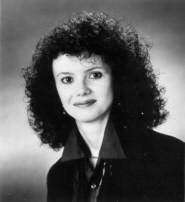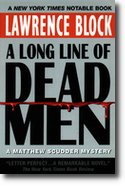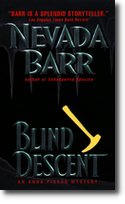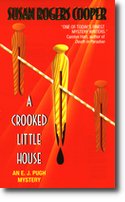A Conversation With Jennifer Sawyer Fisher
by Claire E. White
Jennifer Sawyer Fisher is a Senior Editor at Avon Books where she oversees the Avon Twilight mystery line and also

|
Jennifer spoke with us about the Avon Twilight Mystery imprint which she oversees, current trends in the mystery and thriller genres, and gives some great advice for writers trying to break into the field.
How did you get your start in the publishing industry?
Oh, I got lucky (laugh). I went to a liberal arts college. Actually, it was someone there who suggested that I actually look at an editorial position. I'm not sure it was necessarily books, but that's what it ended up being. I started out at Kensington Corporation and was there for about five years, then I moved over to the Penguin group on the Dutton/Signet side and was there about two years and I've been at Avon for just shy of two years.
It seems like you do a lot of things at Avon!
(laughs) It might seem like that. I've got a good thing going here. I am a Senior Editor and I oversee the Avon Twilight mystery program. The kinds of books I edit are mysteries, suspense, thrillers, and more mainstream commercial books, such as those by Stephen Cannell. I also have just a few projects on the side which I just call "other" and they're lots of fun: a couple of nonfiction books and some ethnic fiction. The nice thing about Avon is it does afford you the luxury to work on other projects -- not just in your area of expertise. I think that's a luxury today.
Tell us about the launch of Avon's new imprint, Twilight. How did that come about?
Well essentially Avon's always had a history of publishing mysteries. We've got two authors who've been with us for a while now. One is Jill Churchill the other is Mary Daheim. They go way back, meaning five, six, seven years or so.
| "If you don't love what you're doing, if you're not invested 100% into writing, as I need to be into editing, you will never be a success as a writer. This life's too short to do something you don't love." |
How many titles does Twilight publish a year?
We do four paperbacks a month. Those might include reprints of our hardcovers. So that's 48 paperbacks a year. We do have a republication program, which is an additional paperback. And then we have approximately 12-16 hardcovers during the course of the year.
What's the focus? Cozies? Thrillers?
I would say its pretty much across the board. Perhaps our history is in the cozy area. Jill Churchill very much writes to a cozy audience. We have some "edgy" books. We publish Lawrence Block's Scudder series in paperback. We also publish Peter Robinson who's done a fairly gritty police procedural.
You have Elizabeth Peters now don't you?
We have Elizabeth Peters. Absolutely. I think our forte is an area that I call sort of "soft medium-boiled", which is to say it's not cozy. When I say the word cozy I think a lot of people think cat mysteries and all that stuff. I'd prefer to call what we publish the "soft medium-boiled," which might feature say a female P.I. whose got some attitude, but she's not out there swearing constantly and tossing back drinks one after another. I think when people hear "hardboiled" they usually think a book is going to be dark with the hero/heroine roaming the mean streets. We strive for diversity. We've got some historical mystery authors as well. We also try to cover all regions. I mean I don't necessarily say, "Oh, we don't have a series set in Texas, so we need one." But the Pacific Northwest was just going great guns for awhile, and we have about four different series set in that general area. So I will be very honest when yet another series comes in set in the Pacific Northwest I say, "Hmmm...what's my shtick here? This better be really, really good, because we have more than enough in that area."
What does a submitting author need to do to really make an impression on you?
We'll I'd have to say -- to be brutally honest -- nowadays it really helps to have an agent. I'm not going to say once you have an agent it's a piece a cake.
 Click here for ordering information. |
So you do look at some things that just come in over the transom?
I always do the courtesy of looking at material that comes into me. I personally do look at it. I just don't give it as much time as I do something that comes from an agent. I'll look at it and if it really makes me think, "Wow! You know what? This really does have a neat angle to it," I will read more.
Do you prefer reading a short query or do you like a synopsis with first three chapters with the query? What do you want to see?
To be honest, just a short intro and some samples of the writing. Even a chapter's really good. Just to give me a feel. Because the writing quality is the important thing. You know, it can be great pitch letter, but if the writing isn't there I don't care how good it is, how good the scenario it is. So it is good to get a taste of the writing.
Let's talk about the author/editor relationship. How do you approach the author/editor relationship? How do you present your suggestion for changes to the manuscript? Is it difficult?
I don't think so. Although, I've worked with some challenging authors over time.
We won't ask you to name names!
Good, because I'm not going to anyway! (laugh) I use the word "challenging" in the sense that they feel very strongly about their work. I also feel equally as strongly that the author/editor relationship is very much a collaborative one. I'm not working in a void, nor are they. I'd like to say that my experience in publishing gives me perhaps some insight or some suggestions to enhance a story, to make it tighter, to make it more focused, or to target the audience in a better way. But I am not the author. And I do not presume to say that I can rewrite the book, nor do I want to rewrite the book. I am not an aspiring author. I have no interest in doing that. So my editorial approach is very much along these lines: I've read it. I think these are the pluses. This is what's holding me back from saying it's the best book that I've read. If you agree with this, great. If you have counter suggestions let me know -- let's talk about this. I feel it should be a very open relationship. On the other hand, if I feel really strongly about something, for example if I really believe a scene doesn't work and the author thinks it does, then we will tussle back and forth a bit. But it's very infrequently that I just say flat out, "It should be this way just because it should. Because I say so." That's not the way I work. At all.
What are the worst mistakes that you see in manuscripts that land on your desk written by first-time authors?
The worst mistakes? I think writing a story that they perceive as saleable that they're not truly invested in. "Legal thrillers are selling; I should write a legal thriller. I have some law experience." Or, God forbid, "I don't have any law experience; I know, I'll write a legal thriller." Or, "I'm fumbling my way through this, but it seems like its hot and I'm going to write it." And it doesn't work. It just doesn't work. I've have seen authors write a book that they love that's really from the heart. Maybe it doesn't sell this year. But if they're truly in this business for the long haul, if they truly have the desire to write, they'll stick with it. And that manuscript they wrote three years ago can suddenly be exactly what I'm looking for now. So writing to the perceived market is a negative, although, authors do have to keep in mind what is selling. I mean, I'm not going to kid you and say write anything that you want and eventually you'll sell it. Absolutely, not. But if you're only writing because you think it's a cool, hip thing to be writing right now, believe me it shows. It's almost as if that's written in huge red letters across the manuscript.
There has been a lot of talk in the press about how all the recent mergers in the publishing industry will negatively affect the authors, reduce the number of books on the shelves and many other terrible things. Have the fears been justified or not?
Not really, I don't think. I mean it's absolutely true that the fact that these mergers are taking place has changed the marketplace. Penguin Putnam, where I worked, has a different atmosphere now than when I was there. But I think a shakeout of sorts would have happened naturally even if these mergers hadn't taken place. What happened was publishers got on the same bandwagon. Let's take the mystery area as an example. I think many publishers realized that publishing mysteries was a smart thing, there was a market out there, there was a readership, if they tapped into that readership they could make some money. Everyone jumped on the bandwagon and suddenly you had mysteries coming out your ears. Frankly, maybe not all of them were that well-written. Some of them were based on sort of silly scenarios, and there were too many books glutting the marketplace. There's got to be a natural pullback. Publishing is cyclical, especially within the subgenres. You get too many books out there, you're going to get some backlash. You're going to
| "Another good route to go is the Internet. Creating a website is not a horrendous undertaking. Find a friend to help you, if you're not tech-minded and can't afford to hire someone. If you can have your own website as a place where people can discover your book and discover who you are and get them excited, I think that's a real plus." |
What can a new author do to help assist you with your marketing efforts? Do you like them to go on tours, do you like them to do promotional items? What should they do, especially if they have a limited budget?
I think tours are grossly overrated. A lot of the bookstores now have budgets that they have to work with. Going in there and sitting and signing some copies and doing that kind of stuff -- you know, if you are a newcomer to the game let me tell you it's not like you're going to have a line of twenty people long waiting for you. I think on a general basis, think regional -- anything that an author can do on a regional basis is great. Here in New York City, if I was an aspiring author I'd make a point of getting to know the local bookstore owners. "Hi, My name is Blank; I'd love to sign some copies for you." If there is a reading that they can set up, perhaps most especially in conjunction with other authors, I think that's a real plus. Tap into the area where you are. Use that as your base. Some authors, especially newer authors, like to send out postcards of their covers and, as you get a good mailing list down, it's a good visual way to get the booksellers excited about your book without spending a ridiculous amount of money. Frankly, I think another good route to go is the Internet. Creating a website is not a horrendous undertaking. Find a friend to help you, if you're not tech-minded and can't afford to hire someone. If you can afford it, it's only around $20 - $25 dollars a month to have your URL and everything. You can exchange links with your publisher and sell books on your own website, whether it's through Amazon.com or another online bookseller. Exchange links with other authors in your genre. If you can have your own website as a place where people might discover your book and discover who you are and get them excited, I think that's a real plus. What it comes down to is, if you're one, two even three books out you're not probably making a whole heck of a lot of money and you shouldn't be overspending on promoting your book. Think in concentric circles, think close and then watch those ripples expand. Go to conferences, don't go overboard, but if there are some events in your area, by all means go. The networking is invaluable.
That's great advice. What kind of trends are you seeing in the mystery/thriller area these days? Or coming up in the future?
I think I'll take those two apart. You know, for so long in mysteries the emphasis was
 Click here for ordering information. |
Can you give an example of what you consider to be a high-concept?
I knew you were going to ask that, because I've been struggling with this even when I talk with agents. We all agree that there's something out there and we're just not sure what that is.
Could it be something new you mean? Maybe a new type of hero?
It could be. I guess my feeling is it's more of a variation on something that's been out there. For example, take a medical thriller. How can you take that book and give it a new spin? When I hear the words "medical thriller" I usually think there's a doctor who's in some kind of situation. Either the doctor is fighting evil, or he/she is the villain. Take that a step forward from what's been done before, but don't be unrealistic about it. I think what were all grappling with is, frankly, actually the notion that we're entering a new millennium. Everyone had expectations that like, by the year 2000, we'd be flying to work or something. Twenty years ago the year 2000 seemed like a pretty shocking thing. We'd be living in this futuristic world.
We'd all be in latex bodysuits or something.
Exactly. We'd all have cures for all our diseases. And it would be such a different world. I think were all realizing that's really not going to be happening. But I think were all grappling with a more global concept of who we are. We are here in the USA, but economically, look at the impact Asia's had on us. I think maybe there is an element of that which can be introduced into the books that people are writing that will be a published over a year, two years from now in the new millennium. Financial thrillers are really tricky, they can be dull as dishwasher, but maybe there's an area there to tap. With the stock market skyrocketing high, shooting right upwards, then coming down. Maybe there is something there someone can write about. But not just a typical financial world, like someone's going to put the world into financial chaos and let's try to fix it. That works, but its not fresh. It doesn't feel exciting. I'd love to come up with a specific example for you. I'd love to say, "Oh, I read X recently and it was exactly what I was looking for," but I haven't.
Interesting. You'll know it when you see it.
I surely believe that. Part of it is just finding someone with the writing ability to just get totally jazzed about their idea. That comes through in manuscripts, believe me. Although part of you may say, "This seems a little far fetched," if you can present it in a convincing enough way then you'll sell it. And that's the whole trick.
What do you like to do when you're not editing, reading lots and lots of manuscripts.
(Laughs) Hmm... Oh, you mean that hour a week? I'm very much an outside person. We live on Long Island and I've got this wonderful book of walking trails. There's all these hidden parks that we never even knew about. My husband and I love to just roam around outside. I have a small green thumb. I don't do anything that's too extravagant. That keeps me busy. It's nice to not be looking at little words on pages. Just looking at hopefully flowers, but at least green leaves.
Is there anything else you'd like to see to our readers or authors?
I've said this since I started in publishing, because frankly it applies to the editor as much as it does the author.
 Click here for ordering information. |
|
|
Return to the April 1999 issue of The IWJ.
More from Writers Write
